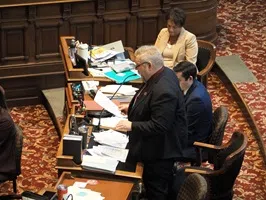(Des Moines) The Iowa Senate passed legislation Tuesday setting work requirements for Iowans on the state’s expanded Medicaid program.
Senate File 615, passed by the Senate in a 33-15 vote, would make work requirements mandatory for the continued existence of the Iowa Health and Wellness Plan, also known as IHAWP, the Medicaid coverage available for low-income, able-bodied adults from ages 19 to 64.
The legislation was amended in committee to require people to work at least 80 hours each month to continue receiving this health coverage. That’s an increase from an earlier version of the Senate bill that set the requirement at 20 hours, but the amended bill aligns with the House work requirements bill.
There are some exceptions to the proposed IHAWP work requirements, including for people with disabilities, in substance abuse treatment programs for a period of up to six months and those with children under age 6. According to the Legislative Services Agency, there are about 181,000 individuals currently enrolled in IHAWP, 12.3% of whom would be medically exempt from work requirements, and another 10% exempt through other provisions under the legislation — leaving roughly 142,000 Iowans subject to work requirements.
LSA stated that about 32,000 individuals may lose IHAWP coverage with the implementation of work requirements. The fiscal note stated that based on data from the implementation of Medicaid work or community engagement requirements in Arkansas, LSA estimated nearly 25% of individuals subject to Medicaid work requirements in Iowa may fail to meet work and reporting requirements and lose IHAWP coverage, with 10.5% estimated to later regain coverage.
The nonpartisan LSA said in its fiscal note that Iowa Department of Health and Human Services has not responded to multiple requests for information, but that it estimated the cost of Medicaid work requirements would result in decreased Medicaid expenditures of $3.1 million in fiscal year 2026 and $17.5 million in FY 2027.
Though few senators spoke on the legislation during floor debate, Sen. Molly Donahue, D-Marion, said after the debate that “the most important thing that people need to know in our communities back home, is that we received a fiscal note that is not worth the paper it is on” because HHS did not respond to LSA’s requests for information. She said she and other lawmakers had also not received information they requested from HHS on the implementation of Medicaid work requirements.
Iowa HHS did not respond to a request for comment on the LSA note or comments made by senators.
“So the only information we have is from Arkansas and Atlanta,” she said. “… We know that in Arkansas, it costs about 27-28 million dollars beyond their savings. And in Georgia, it was 80-some million dollars more than their savings. We are not going to save money on this. It is going to cost Iowa far more — not just the people who are losing their health care if that happens, but those of us who are paying for our health care.”
She said the costs of health care for these individuals will be shifted to others in the system. Donahue argued the legislation will not help push people on IHAWP into the workforce, but create more hardships for low-income people.
“Iowans are not lazy. They are not sitting at home on their little hammock and having a margarita,” Donahue said. “They’re doing what they can, which is why they have this program to help them, because they cannot afford private insurance.”
Under the bill, Iowa HHS would be required to seek a waiver from the federal government to implement these work requirements. If the federal government does not allow for work requirements to be implemented, the legislation directs the Iowa HHS to discontinue IHAWP with a provision to implement an alternative plan if ending the program is not allowed.
Sen. Janet Petersen, D-Des Moines, introduced an amendment that would remove this language. She called the legislation as a whole a “Medicaid repeal bill in sheep’s clothing” — a reference to comments made by Idaho Democratic state Rep. Ilana Rubel regarding a similar bill in Idaho that proposed repealing Medicaid expansion if the federal government did not approve work requirements.
Petersen said the IHAWP program was a “huge bipartisan effort signed by Governor (Terry) Branstad” that lowered Iowa’s uninsured population by 50%. The “trigger language” in the bill, cutting the program if work requirements do not receive federal approval, would strip health coverage from all 181,000 Iowans currently on IHAWP, she said, and would remove the state savings, support for Iowa health care providers and better health outcomes achieved through the program.
“This demands the department to get rid of Medicaid expansion,” Petersen said. “I’ve heard many of you talk about not having health care access in your hometowns — if you look at the fiscal report, it doesn’t even talk about the detrimental impacts if that goes into effect. Get rid of the trigger language in this bill.”
Sen. Mike Klimesh, R-Spillville, the bill’s floor manager, said this provision contained the language “subject to federal approval” for Iowa HHS to be allowed to discontinue the Medicaid expansion program. In this situation, the bill states the state would instead pursue the implementation of an “alternative plan” as allowed for under federal Medicaid administration guidelines.
However, Klimesh said the conversation on the bill should be focused on the importance of work in an individual’s life.
“Work is more than just a paycheck,” Klimesh said. “It provides individuals with a sense of pride, accomplishment, and a deeper connection to society. This bill ensures that individuals receiving Medicaid expansion benefits are given the opportunity to experience this dignity. By requiring work, we are providing an important stepping stone to help Iowans develop the life skills, build responsibility and regain a sense of purpose.”
The measure also directs Iowa HHS to seek approval from the U.S. Department of Agriculture to implement work requirements for other public assistance programs like the Supplemental Nutrition Assistance Program (SNAP). There are already work requirements in place for SNAP recipients — able-bodied adults with no dependents are required to work, participate in work programs or volunteer for at least 80 hours a month to receive benefits.
LSA estimated any additional SNAP work requirements under the legislation would have a “minimal fiscal impact” on the state because SNAP work requirements are already in place.
The House has its version of the Medicaid work requirements bill, House File 948, on the calendar for floor debate Wednesday.
As state lawmakers are advancing bills to set these work requirements, Gov. Kim Reynolds has also pledged to pursue work requirements through executive action. In her Condition of the State address in January, she said she plans to seek a waiver from the Trump administration for these requirements.
Mason Mauro, deputy communications director for the governor’s office, said the governor has directed HHS to seek a waiver, but that the request has not yet been submitted.
“As she stated in her Condition of the State speech, Governor Reynolds has directed HHS to submit a Medicaid Work Requirements waiver which will be done soon,” Mauro said. “The waiver will match the current bill moving through legislation and will install new eligibility requirements for Iowans to be covered by Medicaid. It will include common sense exemptions such as, but not limited to, age, disability, caretaking of children under a certain age, and those on unemployment. Iowans who do not meet the new requirements will be given a time to come into compliance; those who choose not to will no longer be eligible for Medicaid coverage.”
Sen. Mike Klimesh, R-Spillville, spoke during floor debate March 25, 2025 on legislation that would set work requirements for recipients of Iowa’s expanded Medicaid program with some exceptions. (Photo by Robin Opsahl/Iowa Capital Dispatch)








